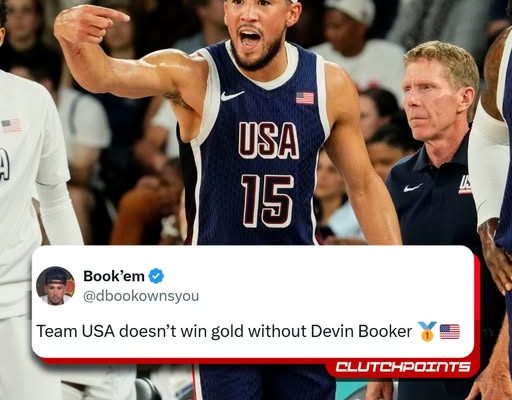One year ago today, Team USA ascended to the top of the basketball world in Paris, capturing the gold medal and etching its place once again in international sporting history. The journey to that victory was not just a story of star power but of cohesion, grit, and the often-overlooked brilliance of role players who made the system hum. While stars like Kevin Durant, Jayson Tatum, and Anthony Edwards drew the headlines and captured the imaginations of fans around the globe, it was arguably Devin Booker who emerged as the ultimate glue on that roster, blending elite scoring with defensive tenacity, court vision, and clutch performance in a way that redefined the role of a “supporting star” on an already loaded squad.
From the outset of the tournament, it was clear that this Team USA roster was built for balance. The coaching staff prioritized versatility and basketball IQ, seeking players who could not only execute their individual talents but also elevate the collective unit. Booker’s inclusion was not met with the same fanfare as some of the league’s superstars, but for those paying attention, his skill set and maturity made him an indispensable piece of the puzzle. On paper, he might have been labeled a secondary option, but in practice, he became the linchpin, seamlessly filling gaps on both ends of the floor while absorbing the pressure of pivotal moments.
What set Booker apart as a role player was his extraordinary ability to balance scoring with playmaking. In Paris, Team USA often relied on quick bursts of offense to counter the disciplined European and world-style defenses they faced. Booker’s proficiency as a catch-and-shoot threat, his mastery of mid-range and pick-and-roll execution, and his ability to create off the dribble allowed the team to stretch defenses and open lanes for his teammates. More importantly, he did all of this without dominating the ball or disrupting the flow of more prominent stars. In international basketball, where possession is precious and defensive schemes are intricate, Booker’s efficiency and basketball IQ provided a steadying hand. He could slide into any lineup configuration, read defensive rotations instantly, and make decisions that maximized team efficiency rather than his own individual stats.
Defensively, Booker’s contribution cannot be overstated. Historically, Team USA has often been criticized for relying heavily on offensive talent while neglecting defensive cohesion. That was not the case in Paris. Booker embraced a defensive identity, switching onto multiple positions, contesting shots, and providing help defense at crucial moments. His agility and anticipation allowed him to disrupt passing lanes and create transition opportunities, fueling Team USA’s fast-break offense. In games against top-tier international competition, where the margin for error is razor-thin, Booker’s defensive versatility often proved decisive. He may not have been the headline-grabbing shot-blocker or the rim-protecting anchor, but his contributions were the sort that changed the complexion of the game subtly yet profoundly.
Another dimension of Booker’s impact was his intangible leadership. While he was not the vocal floor general in the traditional sense, his calm demeanor, relentless work ethic, and quiet confidence inspired his teammates. In moments when games hung in the balance, particularly in tight matchups against European powerhouses, Booker’s composure under pressure set a tone. He exemplified how a player could exert influence without dominating the conversation, leading by example and encouraging cohesion among a team of superstars who each brought their own competitive fire.
Statistically, Booker’s performance in Paris may not have always jumped off the box score compared to the likes of Durant or Tatum, but his impact transcended points per game or shooting percentages. His spacing, ability to draw defenders, and knack for making the right pass at the right time amplified the efficiency of those around him. International basketball often rewards players who understand tempo, rotations, and timing, and Booker’s mastery of these elements made him an invaluable asset. Watching him in action, one could see the subtle artistry of a player whose impact was woven into the fabric of the team rather than showcased in isolation.
Critics may argue that calling Booker the “greatest role player in Team USA history” stretches conventional definitions, particularly given the star-studded lineups of the past. But if one examines the essence of the term—players whose influence is vital yet often understated—Booker’s case is compelling. In previous iterations of Team USA, role players frequently provided either defensive stability or scoring bursts, but few combined both to the level Booker demonstrated in Paris. His ability to seamlessly integrate into lineups, manage high-pressure situations, and elevate his team in subtle but critical ways arguably sets a new benchmark for what a role player can be.
The gold medal run itself highlighted Booker’s contributions repeatedly. In the semifinals and finals, when Team USA faced cohesive teams with strong defensive schemes, his versatility allowed the coaching staff to implement multiple strategic adjustments without sacrificing offensive output. He could stretch the floor, attack gaps, and switch seamlessly on defense—all while complementing the league’s biggest stars. These moments showcased not only his skill but his intelligence, understanding where he could make the most impact without overextending or seeking personal glory.
In addition to his on-court prowess, Booker represented a model of professionalism off the court. Team chemistry is often overlooked in discussions about success, yet it is essential in short-term tournaments like the Olympics or World Cup, where players must coalesce quickly. Booker’s humility, commitment to preparation, and supportive demeanor fostered trust among teammates and reinforced a culture of accountability and mutual respect. This environment allowed other stars to flourish without friction and made the team as a whole greater than the sum of its parts.
It is worth considering Booker’s role in historical context. Previous Team USA squads have featured players who dominated as primary stars but relied on a supporting cast that often struggled for identity. Booker demonstrated that a player could occupy a “supporting” role and yet be central to the team’s success. His blend of scoring, defense, playmaking, and leadership challenges the traditional narrative that role players are secondary contributors. In many ways, he redefined the archetype for future international competitions, proving that a modern role player can carry as much influence as a marquee star without commanding the spotlight.
Booker’s impact also extends to the broader perception of American basketball on the global stage. International opponents have adapted to the increasing depth and versatility of Team USA’s roster, and Booker’s performance in Paris demonstrated the importance of well-rounded, intelligent players who can operate in multiple facets of the game. His style exemplifies how American players can dominate through skill, preparation, and teamwork, rather than sheer athleticism alone. This subtle yet powerful shift in approach may influence roster construction for years to come, emphasizing players who contribute holistically rather than relying solely on scoring pedigree.
As we reflect on the one-year anniversary of Team USA’s gold medal victory in Paris, it becomes clear that moments of glory are rarely achieved by superstars alone. Championships are often decided by those who perform the critical, nuanced tasks that allow stars to shine. Devin Booker epitomized that principle. He was the connective tissue of a historic roster, the steady hand that balanced talent with strategy, and the quiet force that allowed Team USA to execute at the highest level. While his contributions may not always dominate headlines, they are the kind that define championships and create lasting legacies.
Ultimately, labeling Booker as the greatest role player in Team USA history is both a celebration of his Paris performance and an acknowledgment of his unique skill set. He embodies the modern basketball ideal: versatile, intelligent, selfless, and capable of influencing the game in countless ways beyond scoring. His gold medal in Paris was not merely a triumph for Team USA; it was a showcase of how excellence can manifest in roles that are often underestimated yet crucial.
As fans and analysts continue to dissect the tournament and revisit the highlight reels, Booker’s name will increasingly appear in discussions of the most impactful players in Team USA lore. He represents a bridge between star power and collective success, demonstrating that the best teams are built not just on talent but on players who understand how to elevate the whole. One year later, his performance stands as a reminder that greatness comes in many forms, and sometimes the quietest contributors leave the loudest legacy. Team USA’s gold medal in Paris will forever be remembered for the stars who led the charge, but it will also be remembered for Devin Booker, whose mastery of the role player’s craft may have set a new standard for generations to come.
The story of that victory, and Booker’s role within it, is a testament to the evolving nature of basketball. As the game continues to globalize and strategies become more complex, the value of versatile, intelligent role players will only increase. Devin Booker’s gold medal run in Paris is not just a celebration of individual skill; it is a blueprint for team success, a model of unheralded brilliance, and a milestone in the history of American basketball on the world stage. One year later, the impact of that performance continues to resonate, reminding fans, players, and coaches alike that the greatest contributions are not always the loudest, and that true greatness often shines brightest when it is measured not in individual accolades but in collective triumph.



